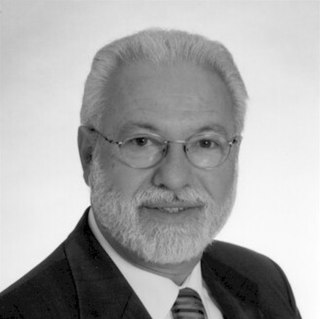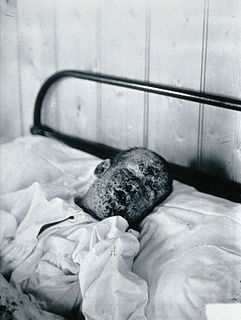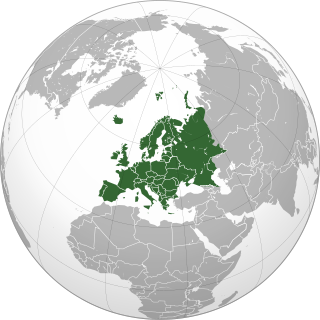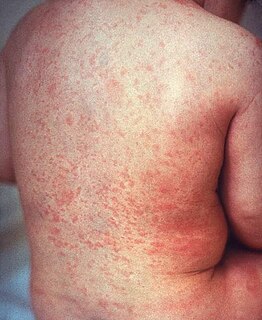
A vaccine is a biological preparation that provides active acquired immunity to a particular disease. A vaccine typically contains an agent that resembles a disease-causing microorganism and is often made from weakened or killed forms of the microbe, its toxins, or one of its surface proteins. The agent stimulates the body's immune system to recognize the agent as a threat, destroy it, and to further recognize and destroy any of the microorganisms associated with that agent that it may encounter in the future. Vaccines can be prophylactic, or therapeutic.

The MMR vaccine is a vaccine against measles, mumps, and rubella. The first dose is generally given to children around 9 to 15 months of age, with a second dose at 15 months to 6 years of age, with at least 4 weeks between the doses. After two doses, 97% of people are protected against measles, 88% against mumps, and at least 97% against rubella. The vaccine is also recommended in those who do not have evidence of immunity, those with well controlled HIV/AIDS, and within 72 hours of exposure to measles among those who are incompletely immunized. It is given by injection.
This is a timeline of the development of prophylactic human vaccines. Early vaccines may be listed by the first year of development or testing, but later entries usually show the year the vaccine finished trials and became available on the market. Although vaccines exist for the diseases listed below, only smallpox has been eliminated worldwide. The other vaccine-preventable illnesses continue to cause millions of deaths each year. Currently, polio and measles are the targets of active worldwide eradication campaigns.

Pulse Polio is an immunisation campaign established by the government of India to eliminate poliomyelitis (polio) in India by vaccinating all children under the age of five years against the polio virus. The project fights poliomyelitis through a large-scale, pulse vaccination programme and monitoring for polio cases. Vellore was the first Indian town to become polio-free through the pulse strategy, and rest of India adopted the strategy in 1995.

A vaccination schedule is a series of vaccinations, including the timing of all doses, which may be either recommended or compulsory, depending on the country of residence.
Mumps vaccines are vaccines which prevent mumps. When given to a majority of the population they decrease complications at the population level. Effectiveness when 90% of a population is vaccinated is estimated at 85%. Two doses are required for long term prevention. The initial dose is recommended between the age of 12 and 18 months of age. The second dose is then typically given between two years and six years of age. Usage after exposure in those not already immune may be useful.

A public health effort to permanently eliminate all cases of poliomyelitis (polio) infection around the world began in 1988, led by the World Health Organization (WHO), the United Nations Children's Fund (UNICEF) and the Rotary Foundation. These organizations, along with the U.S. Centers for Disease Control and Prevention (CDC) and The Gates Foundation, have spearheaded the campaign through the Global Polio Eradication Initiative (GPEI), which helps to coordinate vaccination campaigns, environmental monitoring, evaluation of possible polio cases and logistics. Successful eradication of infectious diseases has been achieved twice before, with smallpox and bovine rinderpest.

Ciro Carlos Araujo de Quadros was a Brazilian leader in the field of Public Health, in particular, the area of vaccines and preventable diseases. He was born in Rio Pardo, Brazil.

Eradication is the reduction of an infectious disease's prevalence in the global host population to zero. It is sometimes confused with elimination, which describes either the reduction of an infectious disease's prevalence in a regional population to zero, or the reduction of the global prevalence to a negligible amount. Further confusion arises from the use of the term eradication to refer to the total removal of a given pathogen from an individual, particularly in the context of HIV and certain other viruses where such cures are sought.
Measles & Rubella Initiative (MRI), launched in 2001, is a long-term commitment and partnership among leaders in public health and supports the goal of reducing measles deaths globally by 90% by 2010 compared to 2000 estimates.
The Expanded Program on Immunization is a World Health Organization program with the goal to make vaccines available to all children.
Every Child By Two (ECBT) is a non-profit organization, based in the United States which advocates for vaccinations. ECBT was founded in 1991, it's stated goals are to "raise awareness of the critical need for timely immunizations and to foster a systematic way to immunize all of America's children by age two." ECBT was founded by former First Lady of the United States, Rosalynn Carter, and former First Lady of Arkansas, Betty Bumpers.

Measles vaccine is a vaccine that prevents measles. Nearly all of those who do not develop immunity after a single dose develop it after a second dose. When rates of vaccination within a population are greater than 92% outbreaks of measles typically no longer occur; however, they may occur again if rates of vaccination decrease. The vaccine's effectiveness lasts many years. It is unclear if it becomes less effective over time. The vaccine may also protect against measles if given within a couple of days after exposure to measles.
Rubella vaccine is a vaccine used to prevent rubella. Effectiveness begins about two weeks after a single dose and around 95% of people become immune. Countries with high rates of immunization no longer see cases of rubella or congenital rubella syndrome. When there is a low level of childhood immunization in a population it is possible for rates of congenital rubella to increase as more women make it to child bearing age without either vaccination or exposure to the disease. Therefore, it is important for more than 80% of people to be vaccinated.
Vaccination Week In The Americas (VWA) is an annual public health campaign by the member states of the Pan American Health Organization (PAHO) to promote equity and access to immunization. It is marked each year during the last week of April.
A vaccine-preventable disease is an infectious disease for which an effective preventive vaccine exists. If a person acquires a vaccine-preventable disease and dies from it, the death is considered a vaccine-preventable death.
European Immunization Week (EIW) is an annual regional initiative, coordinated by the World Health Organization Regional Office for Europe (WHO/Europe), to promote immunization against vaccine-preventable diseases since its launch in 2008. EIW activities are carried out by participating WHO/Europe member states. In the past these have included: disseminating informational materials about immunization, organizing immunization campaigns, organizing training sessions for health care workers, arranging workshops or conferences with political decision makers to discuss immunization, and holding press conferences about immunization-related issues.
Universal Immunization Programme is a vaccination program launched by the Government of India in 1985. It became a part of Child Survival and Safe Motherhood Programme in 1992 and is currently one of the key areas under National Rural Health Mission (NRHM) since 2005. The program now consists of vaccination for 12 diseases- tuberculosis, diphtheria, pertussis (whooping cough), tetanus, poliomyelitis, measles, hepatitis B, diarrhoea, Japanese encephalitis, rubella, pneumonia and Pneumococcal diseases. Hepatitis B and Pneumococcal diseases was added to the UIP in 2007 and 2017 respectively.

World Immunization Week is a global public health campaign to raise awareness and increase rates of immunization against vaccine-preventable diseases around the world. It takes place each year during last week of April.














